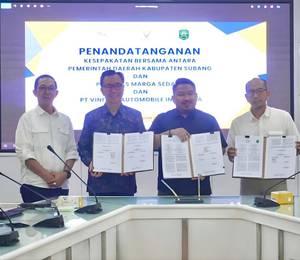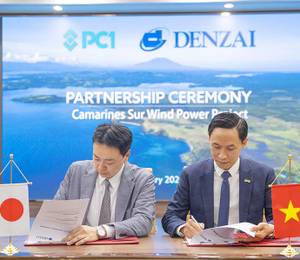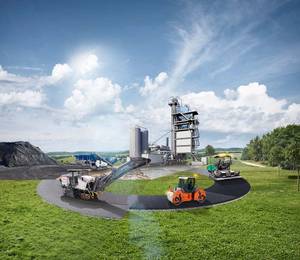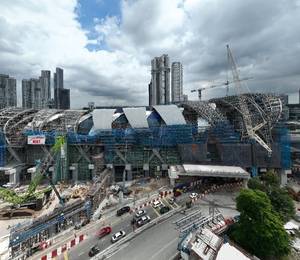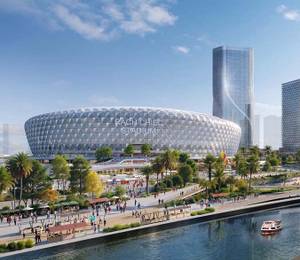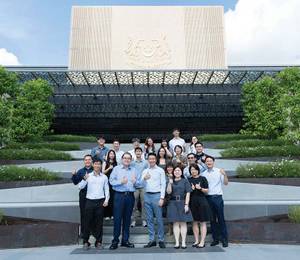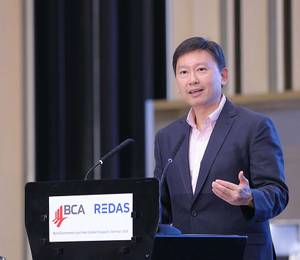The Building and Construction Authority (BCA) projects the total construction demand in Singapore (i.e. the value of construction contracts to be awarded) to range between S$27 and S$32 billion in 2023.
The public sector is expected to contribute about 60% of the total construction demand, between S$16 and S$19 billion. This is supported by a continued strong pipeline of public housing projects amid Housing Development Board’s (HDB) ramping up of build-to-order (BTO) flats supply. Industrial and institutional building construction is expected to contribute strongly to public sector demand, with more projects for the construction of water treatment plants, educational buildings and community clubs. Civil engineering construction demand is anticipated to stay firm with continued support from MRT line construction and other infrastructure works.
Private sector construction demand is projected to be between S$11 and S$13 billion in 2023, comparable with 2022 figures. Both residential and industrial building construction demand are expected to be similar to last year’s level, underpinned by the development of new condominiums and high-specification industrial buildings. Due to the rescheduling of some major projects from 2022 to 2023 as well as the redevelopment of old commercial premises to enhance asset values, commercial building demand is anticipated to increase.
Preliminary construction demand in 2022
The preliminary total construction demand for 2022 reached S$29.8 billion, within BCA’s earlier forecast of S$27-$32 billion and similar to the S$29.9 billion recorded in 2021. The continued firm demand was largely supported by residential and infrastructure projects in both public and private sectors.
Public sector construction demand improved slightly from S$17.8 billion in 2021 to S$17.9 billion in 2022, underpinned by major projects such as the Cross Island MRT Line (Phase 1), Jurong Region MRT Line, the Ministry of Health’s (MOH) healthcare facilities and new build-to-order (BTO) units.
On the other hand, while the private sector construction demand moderated slightly from S$12.1 billion in 2021 to S$11.9 billion in 2022 amid various economic downside risks, demands for private residential and industrial building developments remained resilient.
Construction output
The total nominal construction output (value of certified progress payments) is projected to increase to between S$30 and S$33 billion in 2023, from the preliminary estimate of about S$30.2 billion for 2022. This is due to a steady level of construction demand and some backlog of remaining workloads impacted by the Covid-19 outbreak since 2020.
“Even though construction demand appears to be steady, we must remain vigilant,” cautioned Desmond Lee, Singapore’s Minister for National Development and Minister-in-charge of Social Services Integration.
Speaking at the BCA-REDAS Built Environment and Property Prospects Seminar yesterday (12 Jan), Mr Lee highlighted the challenges ahead, which include “the growing risk of recession in major economies around the world, supply chain pressures as countries continue to adjust their Covid-19 management policies, and the existential threat of climate change.”
“It is important that we take in what we have learnt over the past few years during the pandemic to enhance our BE [built environment] sector’s resilience,” he reminded. “This includes reducing our reliance on foreign manpower for labour-intensive tasks, and doing more to fulfil our net-zero climate goals.”
Forecast for 2024-2027
Over the medium-term, BCA expects the total construction demand to reach between S$25 and S$32 billion per year from 2024 to 2027.
The public sector will continue to lead demand and is expected to contribute S$14-$18 billion per annum from 2024 to 2027, with about 60% of demand made up by building projects and the rest by civil engineering works.
Besides public housing developments, public sector construction demand over the medium-term will be supported by various major developments, such as MRT projects including the Cross Island Line (Phases 2 & 3), Downtown Line Extension to Sungei Kadut and Brickland North South Line station, as well as Toa Payoh Integrated Development and Woodlands Checkpoint redevelopment.
Private sector construction demand is projected to remain steady over the medium-term, reaching approximately S$11-$14 billion per annum from 2024 to 2027, in view of healthy investment commitments amid Singapore’s strong economic fundamentals.
Mr Lee pointed out that “the government is committed to lead by example as the main driver of construction demand.”
Stepping up transformation efforts
With strong construction demand projected for the year, many firms are also stepping up their transformation efforts. Four developers — CapitaLand Development, City Developments Limited, GuocoLand and UOL Group Limited — have signed Memorandums of Understanding (MOUs) with their respective value chain partners (builders, consultants and sub-contractors) to support one another in an attempt to improve productivity, reduce foreign labour and build resilience against unprecedented crises.
These firms will be jointly applying for BCA’s Growth and Transformation Scheme (GTS), which was announced in March 2021, and other relevant grants. To receive support in the transformation journey, the firms are required to demonstrate that their proposed business plans and initiatives will meet outcomes under five categories: strategic collaboration/business growth, human capital development, productivity, digitalisation, and sustainability.
CapitaLand Development (CLD)
MOU partners: Woh Hup (Private) Limited, Threesixty Cost Management Pte Ltd, SJ Architecture, Santai Construction (S) Pte Ltd, and Kai Peng Construction Pte Ltd.
Through this strategic partnership, CLD and its partners are studying the implementation of collaborative contracting and project management for its projects. This involves putting in place structured processes with enablers such as a digital platform and systematic mechanism to facilitate better communications and collaboration, guide early identification of issues as well as manage dispute resolution and risk allocation.
City Developments Limited (CDL)
MOU partners: Woh Hup (Private) Limited, ADDP Architects LLP, Teamtech Private Limited, and China Star Building Construction.
CDL is working towards establishing a common data environment (CDE) platform that connects value chain partners working on a project. CDE enables data sharing across all parties, creating a one-stop conducive environment for upfront cross-disciplinary collaboration and facilitating a single source of truth for all stakeholders.
GuocoLand
MOU partners: Kimly Construction Pte Ltd, Woh Hup (Private) Limited, ADDP Architects LLP, DP Architects Pte Ltd, CGW Construction & Engineering, Integrated Precast Solutions Pte Ltd, APP Engineering Pte Ltd, DLE M&E Pte Ltd, and Sing Moh Electrical Engineering Pte Ltd.
GuocoLand aims to establish a cloud-based CDE platform from design to facilities management (FM) that will connect their value chain partners to work towards common productivity, quality control, decarbonisation and achieving environmental, social and governance (ESG) goals. GuocoLand will look into making it commercially available for their partners.
The developer has also begun to transform existing assets into smarter and greener buildings, and implement integrated data delivery and digital solutions for all their ongoing developments.
UOL Group Limited
MOU partners: United Tec Construction Pte Ltd and P&T Consultants Pte Ltd.
UOL is committed to supporting its partners in the adoption of new technology to improve productivity across the value chain. UOL and United Tec have collaborated on several projects, including the 56-storey Avenue South Residence, which is the world’s tallest residential building using the prefabricated prefinished volumetric construction (PPVC) method.
The success of such support and collaboration has increased confidence between partners to leverage technology, develop strong alliance and accelerate transformation growth in the BE industry.
All images: BCA-REDAS

